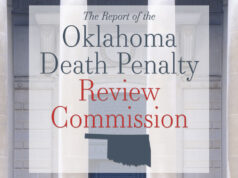More than a year’s worth of work has culminated in an almost 300-page report released by a bipartisan group tasked with reviewing Oklahoma’s capital punishment procedures.
In the report (embedded below), the 11-member Oklahoma Death Penalty Review Commission unanimously agrees that the state’s moratorium on capital punishment continue until “significant reforms” can be made.
From the report’s executive summary, released last week:
Many Oklahomans support the availability of the death penalty, as evidenced by the vote in favor of State Question 776 in the November 2016 election. Nevertheless, it is undeniable that innocent people have been sentenced to death in Oklahoma. And the burden of wrongful convictions alone requires the systemic corrections recommended in this report.
Oklahoma has imposed a moratorium on executions since October 2015. The moratorium followed the January 2015 execution of Charles Warner, in which the wrong drug was used.
Changes recommended, conclusions made
The voluminous report recommends no less than 46 changes aimed at “systemic problems in key areas, including forensics, innocence protection, the execution process and the roles of the prosecution, defense counsel, jury and judiciary,” according to a related press release issued Monday afternoon by the House of Representatives.
Throughout the report, citations and data abound. Perhaps the conclusion revealed at the end of Appendix IA constitutes a telling condition of the “systemic” problems cited above:
The data show that death sentencing in Oklahoma is not related to the race of the defendant. However, there are rather large disparities in the odds of a death sentence that correlate with the gender and the race/ethnicity of the victim. Controlling for other factors … cases with white female victims, cases with white male victims, and cases with minority female victims are significantly more likely to end with a death sentence in Oklahoma than are cases with nonwhite male victims.
With regard to specific agencies, the report in one instance suggests the Oklahoma Pardon and Parole Board add diversity to its panel. As reported Monday by The Frontier, the departures of Patricia High and Vanessa Price left the board without a quorum during April and also required a unanimous 3-0 vote among the remaining three male members to approve commutation applications through a two-stage process.
Currently, 15 inmates in Oklahoma await execution dates, according to Reuters.
Rep. Young lauds commission’s ‘heavy work’
Rep. George Young (D-OKC), who is chairman-elect of the Oklahoma Legislative Black Caucus, praised the bipartisan commission for their efforts Monday.
“I cannot thank the commissioners enough for their dedication to reviewing this important subject,” Young stated in a release. “They spent hours poring over documents, interviewing experts and meeting with state officials, and the commission reached unanimous decisions that should not be taken lightly.
“This is heavy work, and the commissioners left no stone unturned when evaluating legal precedents and how they apply to Oklahoma’s practices. Few people would’ve been willing to spend days entrenched in capital punishment procedures, but it was a necessary and noble commitment.”
